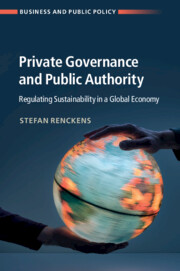Book contents
- Private Governance and Public Authority
- Business and Public Policy
- Private Governance and Public Authority
- Copyright page
- Contents
- Figures
- Tables
- Acknowledgments
- Abbreviations
- 1 Introduction
- 2 Explaining Public Interventions in Private Governance
- 3 Organic Agriculture
- 4 Biofuels
- 5 Fair Trade
- 6 Fisheries
- 7 Evaluating Public Interventions in Private Governance
- Appendix Interviews
- Endnotes
- References
- Index
5 - Fair Trade
Published online by Cambridge University Press: 02 April 2020
- Private Governance and Public Authority
- Business and Public Policy
- Private Governance and Public Authority
- Copyright page
- Contents
- Figures
- Tables
- Acknowledgments
- Abbreviations
- 1 Introduction
- 2 Explaining Public Interventions in Private Governance
- 3 Organic Agriculture
- 4 Biofuels
- 5 Fair Trade
- 6 Fisheries
- 7 Evaluating Public Interventions in Private Governance
- Appendix Interviews
- Endnotes
- References
- Index
Summary
The chapter explains why the EU explicitly decided not to intervene in private fair trade governance on two separate occasions, in 1999 and in 2009. The chapter starts by comparing private fair trade governance schemes, including Fairtrade International, Rainforest Alliance, and UTZ Certified. It then discusses why EU policymakers in the 1990s focused on Fairtrade only and declined to intervene because of the specific North–South trade dynamics of this issue area; the lack of concrete productive opportunities in the EU; and institutional constraints of the international trade regime. The Fair Trade movement’s successful harmonization of complementary private governance schemes also contributed to the EU’s non-interventionist approach. The broadening of the policy domain beyond Fairtrade in the early 2000s did not lead to fragmentation concerns, since differences among the schemes were framed as commercial and economic-ideological in nature and not problematized as a fragmentation issue. Active lobbying by and on behalf of private governance schemes ensured this outcome, resulting in a market for private governance that remains free of public intervention.
Keywords
- Type
- Chapter
- Information
- Private Governance and Public AuthorityRegulating Sustainability in a Global Economy, pp. 128 - 161Publisher: Cambridge University PressPrint publication year: 2020



